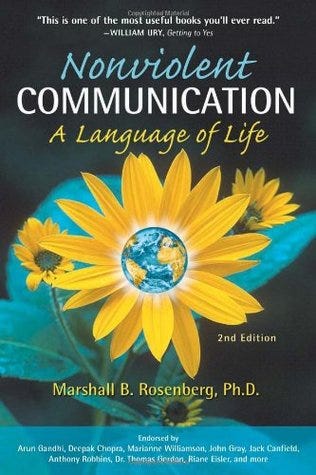If you're looking at a review for this book, you are likely asking yourself: "Should I read it?". In the following lines I'll summarize its contents, but I can quickly jump to answer your question and say that in my opinion, yes, you should. Why? Let's go onto that.
Nonviolent Communication (NVC from now on) is a self-help book intended to explain you a method of cultivating intense empathy that springs from the heart, so as to establish a better base for communication with other people. The starting assumption is that people are predisposed towards empathy, connection and generosity, but we get sidetracked in these by, among other things, the wrong forms of communication. NVC proposes 4 steps that should guide you for avoiding this:
1) The first step is *observation*. Here you have to be factual and objective, and avoid at all costs being judgmental and putting labels and expectations on others, e.g. 'you arrived late', not 'you are lazy'.
2) The second step is *feelings*. How do the facts and actions of others make you feel? How do they feel? Important to avoid rationalizations and thoughts.
3) The third step is *needs*. The feelings you / others had in a communication arise from deeply felt needs you/they have. Which are these? What feelings come from them not being met?
4) The fourth step is *requests*. You clearly request actions that would satisfy your/their needs, but without demanding (=there's no active or passive 'punishment' for rejection).
The author, who is a practicing psychotherapist, explains all this with numerous personal examples from his practice on how adopting this mindset and following its steps helps to make your interlocutor enter a 'safe space' of openness, of 'being really heard' and of opening up to their needs and to others. They lay the basis for a long-drawn-out dialogue were you really *listen* to other people, their feelings and needs, and really try to help them (which avoids typical consolation words or unwanted advice), creating a shared space for a mutual, altruistic and non-manipulative attention to doing and receiving.
The book asks not to be judgmental, but a review has to inevitably be so. I found much of interest in NVC and will be trying to put it into practice. That doesn't mean I agree with everything it contains. It being a self-help book, it feels like that a lot at times (cheesy poetry and optimistic messages, anecdotes without any scientific evidence and testing, 'woo' New Age and Hippie vibes). I don't quite think I share the author's basic premise of humans being naturally predisposed to empathy and compassion - rather, I think that while we do have those instincts, which result from evolution and socialization, they are very frequently stopped, or at the very least in conflict, by a stronger instinct for self-preservation and self-interest. I also feel that the author is too cavalier when dismissing notions of justice, fairness and punishment, and that what he preaches probably can work to an extent at the microlevel but does not scale up to societies and big groups. These caveats aside, I think the message and contents of the book are pretty valuable, and that you should give them a try.
Discussion about this post
No posts




